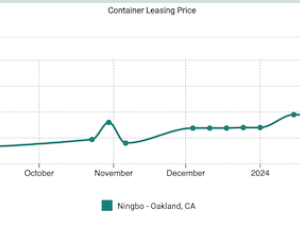ECB Said to Conduct Fresh Review of Ship Loans as Crisis Lingers
By: Nicholas Brautlecht | Jun 22 2016 at 09:35 AM | Liner Shipping
The European Central Bank is conducting an in-depth review of banks’ shipping loan books amid rising provisions for bad debt in an industry still mired in crisis, according to four people familiar with the probe.
The ECB may ask lenders to further increase loan-loss provisions and assign more capital against nonperforming debt, according to the people, who asked not to be identified as the probe hasn’t been public. The central bank sent shipping lenders an e-mail on June 15, seeking details on vessels, such as name and age, and internal assessments of loans and borrowers, said one of the people.
The review follows a clash earlier this year between the bank supervisor and HSH Nordbank AG, Germany’s biggest shipping lender with 23 billion-euro ($26 billion) exposure, over loan valuations tied to a restructuring plan to shed 8.2 billion euros in bad debt and sell itself by 2018. In a reflection of the worsening industry outlook, northern German peer Norddeutsche Landesbank is being forced to increase its stake in its Bremer Landesbank unit, injecting fresh capital to backstop losses of half a billion euros on soured shipping loans.
Shipping Crisis
The ECB’s review echoes a similar look at shipping loans during the asset quality review of the top euro-area banks in 2014. Banks have until July 22 to provide data for 2015 and the first-quarter of this year, and another month to provide historical data, said one of the people. Reuters reported the review on Tuesday.
Container and bulk shipping, which together make up the majority of the maritime loan book of German lenders, are struggling to emerge from a crisis exacerbated by an overcapacity of vessels and slowing world trade. Prices to charter vessels and rates to transport boxes and commodities such as iron ore have have hit lows over the last year, further depressing asset prices of ships.
Lenders across the region have been increasing provisions against their shipping loans. Royal Bank of Scotland Plc, which is primarily overseen by U.K. regulators, took a 193 million-pound ($283 million) charge related to its shipping portfolio in the first quarter, reflecting “difficult conditions.” Non-performing shipping loans at the U.K. lender almost doubled to 827 million pounds from 434 million pounds at the end of December.
Commerzbank AG intends to shed 8 billion euros in shipping loans still on its books following a 2012 decision to completely exit the business.
Germany, which has the world’s biggest container shipping fleet, dominated maritime finance until the collapse of Lehman Brothers Holdings Inc. in 2008 and the euro crisis propelled the industry into a slump.






